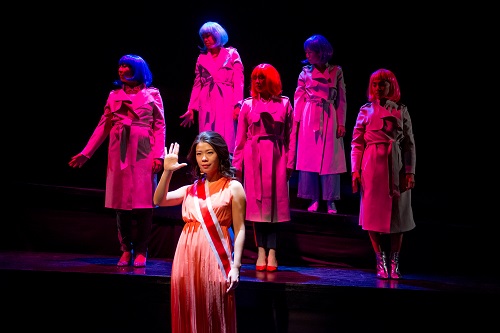
Beautiful and tragic modern adaptation covers an abundance but stays focused and cohesive
Marjorie Chan’s Lady Sunrise, playing at Factory Theatre, is a phenomenal deep dive into the lives of six Asian women set in the early 2000s in Vancouver and Richmond, British Columbia. It follows their personal heartbreaks and professional pains and explores the struggles of trying to survive within the confines of a suffocating culture.
Lady Sunrise is Chan’s loose, modern adaptation of Sunrise, a play about Shanghai women suffering within the toxic culture of their times, published in 1936 by prominent Chinese playwright Cao Yu.
In Lady Sunrise, Chan has moved the story to Vancouver and forward to contemporary times. The play tells the stories of six women whose lives intersect: Tawny Ku (a wealthy, older widow and real estate mogul), Penny (an aspiring socialite who Ku treats like a daughter), Banker Wong (a banker who manages Ku’s investment portfolio), Dealer Li (a widow, mother and casino dealer), Sherry (a young girl working in a massage parlour), and Charmaine (an older woman who works at the same massage parlour).
Their stories confront a culture of consumerism and excess, and each woman’s relationship to money – what it can buy and what it can’t. Ku is wealthy but unhappy and tries unsuccessfully to buy the affection and favour of those around her. Penny is broke, aimless, and suffering from the trauma of earlier sexual assaults, and thinks that if only she had more money, her problems would disappear. Banker Wong earns a high wage but is working herself into an early grave.
Dealer Li’s husband committed suicide in the throes of a gambling addiction and yet she finds herself working as a casino dealer still, desperate to provide a life for their children. Sherry is a young woman new to Canada, working at a massage parlour where she is being trafficked for sex work. Charmaine works at the same massage parlour and has endured much the same.
While the play covers massive ground and goes deep into the story-line of each woman, Director Nina Lee Aquino kept the action focused and cohesive. Moreover, the cast was stellar across the board. I was dazzled by Lindsay Wu, who perfected the role of the insufferable socialite who is suffering internally. I was awestruck by Ma-Anne Dionisio, who was a force of nature as the formidable but softhearted Tawny Ku. Belinda Corpuz left me heartbroken as the trapped, trafficked Sherry, with her desperate pleas for nicer things, for help, for an out.
Lady Sunrise has stayed on my mind since I saw it. It managed to do so many things well. It explored the underbelly of excess and the dark side of a culture where money is king. It had conversations about estrangement, sexual assault, trauma and suicide with rawness and tenderness. It also had moments of warmth and humour that felt like being embraced by all your favourite aunts. It was beautiful and tragic and left me breathless.
Details
- Lady Sunrise is playing at Factory Theatre (125 Bathurst) until March 8, 2020.
- Shows run Tuesday to Saturday at 8PM, and Sunday at 2PM.
- Tickets range from $25 to $50, with discounted tickets available for arts workers, students, and seniors.
- Tickets can be purchased online, in person at the box office, or by phone at 416-504-9971.
- Audience Advisory: This show contains strobe lighting, described sexual assault, implied sexual abuse, and implied suicide.
Photo of Zoé Doyle, Rosie Simon, Ma-Anne Dionisio, Louisa Zhu, Belinda Corpuz and Lindsay Wu by Joseph Michael Photography.
